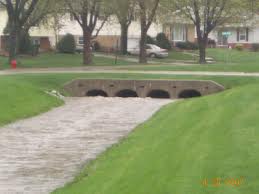 The monthly stormwater management fee for the average homeowner in Roanoke City doesn’t appear to be onerous – maybe about five dollars according to city engineer Phil Schirmer – but they are coming as of July 1, phased in over the next few years. That’s because state and federal stormwater requirements are now compelling localities in the Commonwealth to control how much contaminated runoff (bacteria, fertilizer, etc.) goes in to the watershed – and to clean it up.
The monthly stormwater management fee for the average homeowner in Roanoke City doesn’t appear to be onerous – maybe about five dollars according to city engineer Phil Schirmer – but they are coming as of July 1, phased in over the next few years. That’s because state and federal stormwater requirements are now compelling localities in the Commonwealth to control how much contaminated runoff (bacteria, fertilizer, etc.) goes in to the watershed – and to clean it up.
Roanoke City has adopted a plan and recently published an “Idea book” showing residents and business owners how collecting rainwater in a barrel (for irrigation), creating rain gardens or additional landscaping can earn credits that can reduce their monthly stormwater management fee. That’s really the point anyway said Schirmer; if citizens can reduce the stormwater management workload also that’s fine with the city also.
“If we can encourage homeowners to do the right thing it’s good for Roanoke – and our rivers and streams,” said Schirmer. Those that make changes can fill out an application online; the city will come out to verify that the changes have been made before the credit is doled out.
The stormwater idea book is chockfull of illustrations and photos, showing city taxpayers how they can reduce that impact fee by a maximum of 50 percent. “There’s really quite a number of good resources that are available out there on the internet,” said Schirmer on how the Idea book (available on the city’s website) came together. “We put in some of our ideas as well.”
Basically the city has used satellite images to measure the square footage of impervious surfaces – rooftops, driveways, parking lots, and sidewalks – in determining a fee formula. The more impervious square footage detected (basically anything not green noted Schirmer) the higher the monthly fee. The county could follow suit with a similar format.
Roanoke County’s citizen-led Stormwater Advisory Committee has just completed a series of public meetings where the draft recommendations it will present to the Board of Supervisors soon were reviewed by county residents. Tarek Moneir, Deputy Director of Development Services for the county, has been a point man on the stormwater project. “We have 21 members,” said Moneir – one for each of five magisterial districts, plus representatives from homeowner’s associations and the business community.
Roanoke County already spends about 1.7 million dollars annually on issues related to stormwater programs. The new mandates could add another million to that total. It may adopt a utility fee format similar to the city, hike property taxes or find the money elsewhere in the budget to maintain and upgrade retention ponds, for sediment control, culverts etc.
“They’re focusing on different levels of service that the county can provide,” said Moneir of the stormwater committee. The Department of Environmental Quality will set a level of contamination it deems appropriate for the Roanoke Valley – “total maximum daily load,” Moneir calls it.
There are also changes coming for developers as of July 1; county engineer Dave Henderson said they are working with local developers on the changes, which could make it more expensive, at least initially, to build homes and commercial properties. He also said the stormwater advisory committee is recommending “more than the basic [requirements] to try and cut down on some of the backlog of problems that we currently have.” Stream restorations that may be added would include fixing stream banks to minimize erosion and silt buildup in streams. “We have a lot of learning to do,” Henderson noted at one of the recent community meetings.
At the latest round of public meetings (others were held last year) residents could look at priorities the committees recommended for various levels of stormwater management. The higher the level the more funds the county could spend. Supervisors will make the final determination. “How can we fund the service we would like to see in the county?” is the big question, said Moneir. The committee will meet to discuss the feedback received at this last round of public information sessions before it sends something to the Board of Supervisors.
“Any time you disturb land…there’s some impact [on] the waterways and how the water is transported – we’re talking about the impact on our waterways when it rains,” said Moneir in summarizing the new mandates looming on the horizon. “Who is going to pay for it?”
– Gene Marrano

